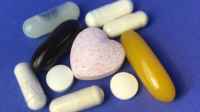Our Members Asked:
I read that sterol supplements to lower cholesterol like CholestOff can block the absorption of vitamins. Is that true?

Answer:
Although generally considered to be quite safe, there is some concern that sterol and stanol supplements might inhibit the absorption of beta-carotene, vitamin E and perhaps other fat-soluble vitamins (A and D) and ingredients such as CoQ10. This is because sterols and stanols work by binding and removing bile acids (which contain cholesterol) from the gut, and bile acids improve the absorption of fats and fat-soluble ingredients.
Typically, this negative effect can be minimized or countered by increasing fruit and vegetable consumption throughout the day to increase intake of these vitamins. Short of that, use of a nutritional supplement is recommended to compensate for reduced absorption, although the nutritional supplement should be taken at a different time than sterols and stanols. (Of course, if you are getting adequate sun exposure, you won't need to supplement with vitamin D.) Similarly, it may be prudent to consider separating doses of plant sterols and stanols from other fat-soluble nutrients such as coenzyme Q10, due to the potential for reduced absorption of these nutrients, although this has not been confirmed in any clinical studies. Plant sterols and stanols must be taken with food to work, so if you want to separate the dosing, the fat-soluble ingredient, such as coenzyme Q10, may need to be taken with a different meal. While coenzyme Q10 is best absorbed when fats or oils are present in the gastrointestinal tract (i.e., during meals), some formulations contain absorption enhancers to reduce the need for fats for absorption (see Absorption and Bioavailability Enhancers in our CoQ10 Supplements Review).
You can compare the evidence and safety for sterols, stanols, and other cholesterol-lowering supplements such as red yeast rice, niacin and soy, plus see our test results for popular products, in the Cholesterol-Lowering Supplements Review >>
(Be aware that two cases of elevated liver enzymes have been reported in individuals taking a particular sterol/stanol supplement.)
Some preliminary evidence suggests that green tea and certain probiotics may also help to modestly lower levels of "bad" LDL cholesterol.
Join today to unlock all member benefits including full access to all CL Answers and over 1,400 reviews.
Join NowAlready a member? Sign In Here.
Join now at www.consumerlab.com/join/







Submit your comment
This feature is restricted to active members.
Join now to add comments and get all member benefits, including over 1,400 reviews.
Join NowAlready a member? Sign in here.